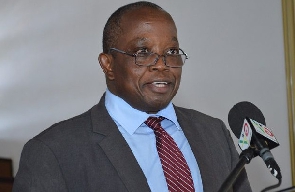(The Facts vs Fiction)
Background
First, to members of our legal profession who have contributed in diverse ways to help shape our legal framework and also contributing to safeguarding the independence of our constitution a big cachet to you all even as we await the final verdict from the apex court of the land.
A letter dated Monday, June 9 from the Presidential outfit signed by the Director of communication in the person of Mr Eugene Arhin directing the Auditor General to proceed on his accumulated annual leave-taking effect from July 2020 has over the past weeks caused a great pandemonium within some members of legal faculty of our country.
Upon receipt of the said letter, some masters of the act of law in the field of practice, as well as academia, have expressed varied concerns, questioning the constitutionality of the executive directive from the President, some contending such directives to be a violation of Article 187(7) of the 1992 constitution of our republic which protects the office of the AG and, as such, apart from the compulsory retirement age of 60 years the AG tenure cannot be disturbed by the President’s directive couched as accumulated leave.
Also, following a suit at the apex court by Prof Asare were a declaration that the Presidents appointment of Mr Asiedu to act as AG is inconsistent with or is in contravention with the letters and spirit of Article 187(1), 187(7)(a) and further called for an interlocutory injunction from the court to set aside the 167 accumulated leave days of Mr Domelevo which took effect on July 1, 2020.
Even though the suit by Prof Asare was stricken out by the court on grounds that, the Attorney General by law happens to be the principal legal advisor to government and as of right represents the government in all civil actions against the state per Article 88 of the constitution hence attaching the Auditor General and Acting Auditor General as a defendant to the suit as filed by the applicant could be referred to as improper parties to the suit.
Big Issues:
As a matter of fact and for good consumption by the Ghanaian reader, the big issue is streamed into 3 segments; First, the office of the Auditor-General and the composition of the Audit Service (Audit Service Act 584), Chain of Command of the Audit Service and Independence of the Auditor General.
For probity and accountability Section 10 of the Audit Service Act (584)reads; there shall be an AG who shall be appointed by the President acting in consultation with the council of state. The AG notwithstanding is a member of the Audit Service with a chairman and four other members appointed by the President, acting in consultation with the Council of State and Head of the Civil Service or his representative.
Chain of Command
Even though the constitution, as well as the Audit Service Act (584), happens to be silent on the chain of command in the absence of the AG in the daily discharge of duty, Article 189 (3) states the Audit Service Board shall, acting in consultation with the Public Services Commission:
(a) determine the terms and conditions of service of officers and other employees in the Audit Service; and
(b) by constitutional instrument, make regulations for the effective and efficient administration of the Audit Service.
It is certain by this constitutional provision that the audit service board which includes the AG shall be the sole regulators of the Office of the Auditor General’s department to ensure the efficient run of the audit service. This also could imply that the audit service board has for its purpose a superior mandate to manage the affairs of the audit service with the inclusion or omission of the AG.
Independence of the AG
Accessing the independence of the AG at the birth of a Presidential directive asking the AG to take its constitutionally mandated leave of 167 days has been an exceptional area of concern due to its powers conferred by the constitution. Over the past few weeks, questions such as; whether or not the AG is total independence has caused an overwhelming stir in the public domain. Generally, social commentators, as well as some members of the Ghana Bar, have questioned the limits to the independence of the AG. ‘’
Questions such as whether or not there is a limit to the independence of the AG, If yes to what extent, If No Why not; Is there any form of checks and balance in the daily discharge of duty by the AG, If Yes, who is responsible for such duty, If No why not; and lastly, the Office of the AG for one reason or the other might incur some form of regular or irregular expenses in the discharge of duty hence the question who audits the office of the Auditor-General.’’
Generally, the office of the Auditor-General is believed to be an important body in our governance structure and should not be toyed with. Again, according to the Audit service Act (584) section 10(5) reads; the salary and allowances payable, and the facilities and privileges available to the Auditor-General shall be determined by the President on the recommendations of a committee of not more than five persons appointed by the President, acting in accordance with the advice of the Council of State.
This could imply that, even though the AG is noted to be independent, there is a limit to this effect on grounds that the salaries and other social benefits payable to the AG as of right is regulated by the President or a committee appointed by the President acting in accordance with the advice of the council of state.
Again, Section 10(9) of Act 584 reads; the Auditor-General may at any time resign his office in writing addressed to the President, which in effect implies or presuppose a higher authority to which the AG responds to regardless of its level of independence. Lastly, the AG’s report submitted to Parliament under Article 187(6) at the end of every financial year is subject to debate on the floor of Parliament.
This could also imply that the report following its reading in Parliament is not regarded as the final working document of the AG until such report undergoes scrutiny and finally certified by Parliament hence a limitation to the independence of the AG.
Opinions of Thursday, 6 August 2020
Columnist: Emmanuel Abu Ampong















